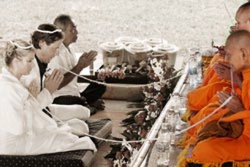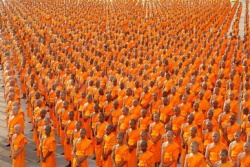Difference between revisions of "Thai Buddhist Wedding ceremony"
(Created page with "thumb|250px| <poem> Thai Buddhist Wedding on Koh Samui thumb|250px| For couples deciding to have their wedding in T...") |
|||
| Line 21: | Line 21: | ||
Couples having a [[Buddhist]] [[Wedding]] will be invited to Faraway for a rehearsal a day or two before the event. During this meeting, not only you will be taught the dos and don'ts of a [[Buddhist]] {{Wiki|ceremony}}; how to sit, how to Wai and how to approach the [[monks]], but we will also explain the [[order]] of service. | Couples having a [[Buddhist]] [[Wedding]] will be invited to Faraway for a rehearsal a day or two before the event. During this meeting, not only you will be taught the dos and don'ts of a [[Buddhist]] {{Wiki|ceremony}}; how to sit, how to Wai and how to approach the [[monks]], but we will also explain the [[order]] of service. | ||
| + | |||
| + | ------------------------------------------------------------------- | ||
| + | Pre-Wedding [[Rituals]] : | ||
| + | |||
| + | The [[Buddhists]] are strict conventionalist in the matters of {{Wiki|ceremonies}} and the weddings are no exception. The augmentation of the pre-wedding [[rituals]] is marked by the formality of asking the bride's family for their assent by the groom's family. The [[propitious]] day for this is decided by the [[monk]] called [[Lama]]. This is followed by the betrothal [[ritual]]. The [[lama]] recites the [[prayers]] and then a concoction called the madyan, which is considered a [[religious]] drink, is served to the guests. The [[astrologer]] or the [[monk]] stipulates the [[auspicious]] day for the [[wedding]]. | ||
| + | |||
| + | The [[Wedding]] : | ||
| + | |||
| + | In the early morning, the bride's and the groom's families arrive at the [[temple]]. The groom's family carries a procession of trays containing [[fruits]], wine, [[traditional]] cake, tea, meat, and most importantly jewelry that the bride will get as dowry. The trays have to be either six or nine in number, never seven or eight as these are considered unlucky numbers. One of the trays also contains a pair of {{Wiki|candles}} which are lit either by the bride and the groom or their [[parents]]; the [[tradition]] varies with places and countries. The lighting up of the two {{Wiki|candles}} [[symbolizes]] the union of the two families. | ||
| + | |||
| + | Before a specially erected [[shrine]] and the {{Wiki|image}} of [[Lord]] [[Buddha]], the couple and the assembly recite a procession hymns- Vandana, Tisarana and Pancasila. The {{Wiki|candles}} and the [[incense]] sticks are lit before the {{Wiki|image}} of [[Lord]] [[Buddha]] and [[flowers]] are [[offered]]. Next, the bride and the groom recite the [[traditional]] undertakings as inscribed in Sigilovdda [[Sutta]]. The groom says: | ||
| + | "Towards my wife I undertake to [[love]] and [[respect]] her, be kind and considerate, be faithful, delegate domestic management, present gifts to please her." | ||
| + | |||
| + | The bride speaks thus: | ||
| + | "Towards my husband I undertake to perform my household duties efficiently, be hospitable to my in-laws and friends of my husband, be faithful, {{Wiki|protect}} and invest our earnings, [[discharge]] my responsibilities lovingly and fastidiously." | ||
| + | |||
| + | The [[wedding]] {{Wiki|ceremony}} is concluded with the recital of Mangal [[Sutta]] and Jayamangala [[Gatha]] as a [[blessing]] for the newlyweds. | ||
</poem> | </poem> | ||
{{R}} | {{R}} | ||
[http://www.weddingsinthailand.com/thai_buddhist_ceremony_wedding.php www.weddingsinthailand.com] | [http://www.weddingsinthailand.com/thai_buddhist_ceremony_wedding.php www.weddingsinthailand.com] | ||
[[Category:Buddhist Wedding ceremony]] | [[Category:Buddhist Wedding ceremony]] | ||
Revision as of 03:30, 25 September 2013
Thai Buddhist Wedding on Koh Samui
For couples deciding to have their wedding in Thailand, the opportunity to be blessed by Buddhist monks should not be missed.
Buddhism is as much a philosophy as it is a religion. The open minded and tolerant nature of the faith allows the clergy to perform wedding rituals for those who know little about it; and even those who have never practiced the religion.
Depending on the wishes of the couple, 5, 7 or 9 orange robed monks will be invited to perform the ceremony. Incenses and an image of the Lord Buddha create an atmosphere of calm and tranquility, with all those attending sat facing the monks.
Led by the senior most clergy, prayers chanted in the ancient Pali language begin the ceremony and bestow blessings on the couple; who kneel close together in front of the monks with their hands in the traditional wai position - a sign of respect and supplication.
The monks will always be facing towards the West.
The senior monk will drape sacred string around the heads of the couple to symbolize their committment to one another, and he sprinkles them with holy water from a leafy branch. Gifts and small donations are presented by the couple to the monks, after which there are more prayers. The ceremony usually lasts for 30 minutes, and conveys an almost hypnotic feeling on all present.
Water Blessing Ceremony
After the monks depart, the bride and groom kneel side by side on a special pedestal to give their guests the opportunity to bestow their invididual blessings. This they do, one by one, by gently pouring water over the hands of the couple. The water passes through the hands of the bride and groom and into a flower filled vessel beneath.
A Buddhist wedding ceremony is as serene and evocative an occasion as one could wish for, and provides the feeling that one's union is welcomed, and entirely in place, in this exotic land.
Couples having a Buddhist Wedding will be invited to Faraway for a rehearsal a day or two before the event. During this meeting, not only you will be taught the dos and don'ts of a Buddhist ceremony; how to sit, how to Wai and how to approach the monks, but we will also explain the order of service.
Pre-Wedding Rituals :
The Buddhists are strict conventionalist in the matters of ceremonies and the weddings are no exception. The augmentation of the pre-wedding rituals is marked by the formality of asking the bride's family for their assent by the groom's family. The propitious day for this is decided by the monk called Lama. This is followed by the betrothal ritual. The lama recites the prayers and then a concoction called the madyan, which is considered a religious drink, is served to the guests. The astrologer or the monk stipulates the auspicious day for the wedding.
The Wedding :
In the early morning, the bride's and the groom's families arrive at the temple. The groom's family carries a procession of trays containing fruits, wine, traditional cake, tea, meat, and most importantly jewelry that the bride will get as dowry. The trays have to be either six or nine in number, never seven or eight as these are considered unlucky numbers. One of the trays also contains a pair of candles which are lit either by the bride and the groom or their parents; the tradition varies with places and countries. The lighting up of the two candles symbolizes the union of the two families.
Before a specially erected shrine and the image of Lord Buddha, the couple and the assembly recite a procession hymns- Vandana, Tisarana and Pancasila. The candles and the incense sticks are lit before the image of Lord Buddha and flowers are offered. Next, the bride and the groom recite the traditional undertakings as inscribed in Sigilovdda Sutta. The groom says:
"Towards my wife I undertake to love and respect her, be kind and considerate, be faithful, delegate domestic management, present gifts to please her."
The bride speaks thus:
"Towards my husband I undertake to perform my household duties efficiently, be hospitable to my in-laws and friends of my husband, be faithful, protect and invest our earnings, discharge my responsibilities lovingly and fastidiously."
The wedding ceremony is concluded with the recital of Mangal Sutta and Jayamangala Gatha as a blessing for the newlyweds.

